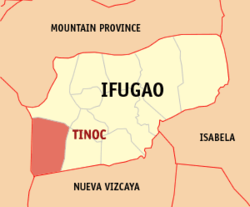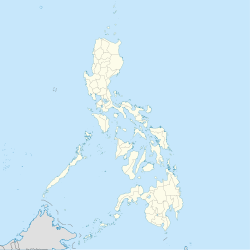Tinoc, officially the Municipality of Tinoc is a municipality in the province of Ifugao, Philippines. According to the 2020 census, it has a population of 18,475 people.[3]
Tinoc | |
|---|---|
| Municipality of Tinoc | |
 Map of Ifugao with Tinoc highlighted | |
Location within the Philippines | |
| Coordinates: 16°40′30″N 120°56′12″E / 16.675°N 120.9367°E | |
| Country | Philippines |
| Region | Cordillera Administrative Region |
| Province | Ifugao |
| District | Lone district |
| Founded | January 28, 1983 |
| Barangays | 12 (see Barangays) |
| Government | |
| • Type | Sangguniang Bayan |
| • Mayor | Samson C. Benito |
| • Vice Mayor | Efren A. Tacio |
| • Representative | Solomon R. Chungalao |
| • Municipal Council | Members |
| • Electorate | 11,378 voters (2022) |
| Area | |
• Total | 239.70 km2 (92.55 sq mi) |
| Elevation | 1,644 m (5,394 ft) |
| Highest elevation | 2,737 m (8,980 ft) |
| Lowest elevation | 944 m (3,097 ft) |
| Population (2020 census)[3] | |
• Total | 18,475 |
| • Density | 77/km2 (200/sq mi) |
| • Households | 4,504 |
| Economy | |
| • Income class | 4th municipal income class |
| • Poverty incidence | 4.39 |
| • Revenue | ₱ 136 million (2020), 45.96 million (2012), 52.59 million (2013), 58.99 million (2014), 69 million (2015), 107.3 million (2016), 87.01 million (2017), 94.27 million (2018), 102.7 million (2019), 124.7 million (2021), 173.7 million (2022) |
| • Assets | ₱ 359 million (2020), 71.37 million (2012), 76.71 million (2013), 85.26 million (2014), 105.3 million (2015), 86.7 million (2016), 200.7 million (2017), 243.8 million (2018), 318 million (2019), 421.3 million (2021), 499.1 million (2022) |
| • Expenditure | ₱ 127.5 million (2020), 45.18 million (2012), 44.2 million (2013), 45.48 million (2014), 54.92 million (2015), 60.87 million (2016), 60.11 million (2017), 69.48 million (2018), 85.94 million (2019), 101 million (2021), 121.2 million (2022) |
| • Liabilities | ₱ 32.96 million (2020), 36.01 million (2012), 38.9 million (2013), 38.64 million (2014), 49.08 million (2015), 88.28 million (2016), 81.71 million (2017), 60.88 million (2018), 25.18 million (2019), 41.97 million (2021), 66.07 million (2022) |
| Service provider | |
| • Electricity | Ifugao Electric Cooperative (IFELCO) |
| Time zone | UTC+8 (PST) |
| ZIP code | 3609 |
| PSGC | |
| IDD : area code | +63 (0)74 |
| Native languages | Ifugao Kallahan Tuwali Ilocano Tagalog |
| Website | www |
Geography
editBarangays
editTinoc is politically subdivided into 12 barangays. [5] Each barangay consists of puroks and some have sitios.
- Ahin
- Ap-apid
- Binablayan
- Danggo
- Eheb
- Gumhang
- Impugong
- Luhong
- Tinoc (Poblacion)
- Tukucan
- Tulludan
- Wangwang
Climate
edit| Climate data for Tinoc, Ifugao | |||||||||||||
|---|---|---|---|---|---|---|---|---|---|---|---|---|---|
| Month | Jan | Feb | Mar | Apr | May | Jun | Jul | Aug | Sep | Oct | Nov | Dec | Year |
| Mean daily maximum °C (°F) | 16 (61) |
17 (63) |
18 (64) |
20 (68) |
20 (68) |
19 (66) |
18 (64) |
18 (64) |
18 (64) |
18 (64) |
18 (64) |
16 (61) |
18 (64) |
| Mean daily minimum °C (°F) | 9 (48) |
9 (48) |
10 (50) |
12 (54) |
14 (57) |
14 (57) |
14 (57) |
14 (57) |
13 (55) |
12 (54) |
11 (52) |
10 (50) |
12 (53) |
| Average precipitation mm (inches) | 38 (1.5) |
57 (2.2) |
77 (3.0) |
141 (5.6) |
390 (15.4) |
355 (14.0) |
426 (16.8) |
441 (17.4) |
426 (16.8) |
259 (10.2) |
97 (3.8) |
57 (2.2) |
2,764 (108.9) |
| Average rainy days | 10.4 | 12.1 | 15.4 | 20.4 | 26.7 | 27.1 | 28.7 | 28.0 | 26.4 | 19.9 | 14.1 | 12.3 | 241.5 |
| Source: Meteoblue[6] | |||||||||||||
Demographics
edit| Year | Pop. | ±% p.a. |
|---|---|---|
| 1990 | 8,256 | — |
| 1995 | 9,504 | +2.67% |
| 2000 | 9,783 | +0.62% |
| 2007 | 12,045 | +2.91% |
| 2010 | 14,147 | +6.03% |
| 2015 | 16,559 | +3.04% |
| 2020 | 18,475 | +2.18% |
| Source: Philippine Statistics Authority[7][8][9][10] | ||
In the 2020 census, the population of Tinoc was 18,475 people,[3] with a density of 77 inhabitants per square kilometre or 200 inhabitants per square mile.
Religion
editEvangelical and Protestant churches have a strong presence with 48% adherence. There is a significant presence of catholic and animisim.[citation needed]
Economy
editPoverty incidence of Tinoc
10
20
30
40
50
60
2006
52.00 2009
49.62 2012
53.47 2015
34.49 2018
26.96 2021
4.39 Source: Philippine Statistics Authority[11][12][13][14][15][16][17][18] |
Government
editLocal government
editTinoc, belonging to the lone congressional district of the province of Ifugao, is governed by a mayor designated as its local chief executive and by a municipal council as its legislative body in accordance with the Local Government Code. The mayor, vice mayor, and the councilors are elected directly by the people through an election which is being held every three years.
Elected officials
edit| Position | Name |
|---|---|
| Congressman | Solomon R. Chungalao |
| Mayor | Samson C. Benito |
| Vice-Mayor | Fernando W. Gapuz |
| Councilors | Randy B. Humakey |
| Marcos D. Canute | |
| Yolanda B. Patnaan | |
| Journy D. Madanny | |
| Michael H. Pindog | |
| Danilo B. Baguista | |
| Mercury C. Binwihan | |
| Viola A. Nginhayan |
References
edit- ^ Municipality of Tinoc | (DILG)
- ^ "2015 Census of Population, Report No. 3 – Population, Land Area, and Population Density" (PDF). Philippine Statistics Authority. Quezon City, Philippines. August 2016. ISSN 0117-1453. Archived (PDF) from the original on May 25, 2021. Retrieved July 16, 2021.
- ^ a b c Census of Population (2020). "Cordillera Administrative Region (CAR)". Total Population by Province, City, Municipality and Barangay. Philippine Statistics Authority. Retrieved 8 July 2021.
- ^ "PSA Releases the 2021 City and Municipal Level Poverty Estimates". Philippine Statistics Authority. 2 April 2024. Retrieved 28 April 2024.
- ^ "Province: Ifugao". PSGC Interactive. Quezon City, Philippines: Philippine Statistics Authority. Retrieved 12 November 2016.
- ^ "Lagawe: Average Temperatures and Rainfall". Meteoblue. Retrieved 8 March 2020.
- ^ Census of Population (2015). "Cordillera Administrative Region (CAR)". Total Population by Province, City, Municipality and Barangay. Philippine Statistics Authority. Retrieved 20 June 2016.
- ^ Census of Population and Housing (2010). "Cordillera Administrative Region (CAR)" (PDF). Total Population by Province, City, Municipality and Barangay. National Statistics Office. Retrieved 29 June 2016.
- ^ Censuses of Population (1903–2007). "Cordillera Administrative Region (CAR)". Table 1. Population Enumerated in Various Censuses by Province/Highly Urbanized City: 1903 to 2007. National Statistics Office.
- ^ "Province of Ifugao". Municipality Population Data. Local Water Utilities Administration Research Division. Retrieved 17 December 2016.
- ^ "Poverty incidence (PI):". Philippine Statistics Authority. Retrieved December 28, 2020.
- ^ "Estimation of Local Poverty in the Philippines" (PDF). Philippine Statistics Authority. 29 November 2005.
- ^ "2003 City and Municipal Level Poverty Estimates" (PDF). Philippine Statistics Authority. 23 March 2009.
- ^ "City and Municipal Level Poverty Estimates; 2006 and 2009" (PDF). Philippine Statistics Authority. 3 August 2012.
- ^ "2012 Municipal and City Level Poverty Estimates" (PDF). Philippine Statistics Authority. 31 May 2016.
- ^ "Municipal and City Level Small Area Poverty Estimates; 2009, 2012 and 2015". Philippine Statistics Authority. 10 July 2019.
- ^ "PSA Releases the 2018 Municipal and City Level Poverty Estimates". Philippine Statistics Authority. 15 December 2021. Retrieved 22 January 2022.
- ^ "PSA Releases the 2021 City and Municipal Level Poverty Estimates". Philippine Statistics Authority. 2 April 2024. Retrieved 28 April 2024.
- ^ "2019 National and Local Elections" (PDF). Commission on Elections. Retrieved March 13, 2022.
External links
edit- Philippine Standard Geographic Code
- Philippine Census Information
- Local Governance Performance Management System



